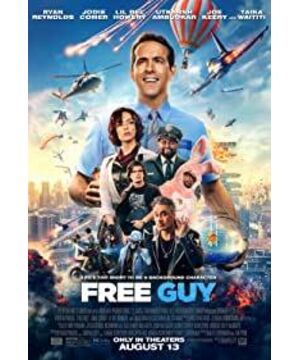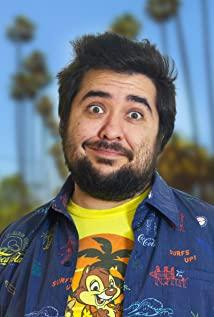In all fairness, "Out of Control Player" is a hodgepodge movie above the passing line, with the smoothness and entertainment guaranteed by a mature industrial assembly line.
Although the main creator has repeatedly emphasized its originality (not based on existing IP, comics or series of movies), audiences who are familiar with Hollywood will definitely be hit by the familiar plot stream when watching the film: "Groundhog Day" The cyclical rebirth of "Edge of Tomorrow", the protagonist of "The Matrix" and "Trumen's World" awakens, and the whole story based on the game (including the word "player" on the Chinese translation) is similar to Spielberg's The world’s stunning "Number One Player" hits me full; even starring Ryan Reynolds's slightly ridiculous character will quickly remind him of the popular Marvel character "Deadpool" he once played. .
Not only is the text core highly similar, "Out of Control Player" also learns from "Number One Player" (the two works also have the same screenwriter Zach Payne), and simply carried the "usage doctrine" to the end in the climax battle scene. It is the iconic element of the most popular commercial giants such as Marvel and Star Wars. Everything shows that the so-called originality and sense of comedy in this film are entirely based on the inheritance and joking of past films.
The process of recognizing the lack of originality of the film is a natural game between the audience and the creator, but at the same time it accidentally opens a layer of intertextual relationship and truly becomes the beginning of the movie watching game. This does not only mean that in the smooth progress of the plot, the audience recognizes Guy’s identity as an NPC in the game in advance, but furthermore, the audience quietly completes the perceptual synchronization with the protagonist, becomes suspicious of the surrounding environment, and immediately jumps. Get out of the established track and no longer be willing to receive information passively-this is also an interpretation of the "out of control" of the subject eye, although it will inevitably partially compromise the sense of participation and substitution.
The muscular monster Dude is another concrete embodiment of "out of control"-a cute harlequin who has become a defective product in terms of lines, actions and logic. In my opinion, he really connected the two major media of games and movies in the film, and vividly explained the embarrassment of the forced integration of the two. Dude's facial capture and synthesis has a clear sense of falsehood, and it is difficult to judge whether it was deliberately, but just like "Gemini Killer"'s "age reduction" to Will Smith, the lack of technology just gives the image "inhuman" feel.
If you put aside the above slightly tricky viewing angle and focus on the story presented in the movie, the appropriation of basic settings and the extraction of popular cultural symbols by "Out of Control Player" is undoubtedly fast food. Although its obvious themes are artificial intelligence and capitalism, its resistance is extremely superficial and superficial, and it seems to try its best to avoid any thinking burden on the audience. This has become a kind of "authority" of director Sean Levy. In his most famous fantasy film series "A Wonderful Night at the Museum" or the action movie "Steel Fist", the core driving force is originally inanimate. Objects are endowed with human emotions, and his expression tends to reconcile and balance: the harmonious coexistence of man and machine, man and natural objects-man always stays at the center, Happy Ending as always.
Unlike "Top Player" or "Avatar" (the action of "connecting" the body is similar to wearing a VR headset), "Out of Control Player" has almost no desire to discuss the issue of "virtuality and reality", and this It can be said that it is a natural attribute of game movies. It is willing to find Channing Tatum to wreak havoc on its screen image while strengthening its stereotype of otaku, just to create a joke with strong contrast-when the protagonist easily wins the task, the real group of players is Abandoned like a shoe.
Another rather crude scene is the farewell between Guy and Millie. Guy, who has finally gained freedom and established his subjective consciousness, suddenly chooses to cut off the relationship between himself and his lover to fulfill the love in the real world. The rhetoric he used is to degrade himself into an "e-love letter". I cannot help but put a word on this thinking path. question mark. If Guy’s awakening is entirely due to a glance at the heroine in the crowd, and the heroine also has a special feeling for Guy, why can both parties quickly pull away after the new world is built, and draw a clear line between virtual and reality The gap?
It is understandable that the screenwriter is eager to close the plot as soon as possible, and is eager to end each narrative clue, but this seemingly cool and relieved explanation comes at the expense of subjectivity, not to mention the faintly embodied imagination of artificial intelligence that is too optimistic. Forget all the oppression imposed on humans, and then enjoy the curious "gaze" of the Creator in the new virtual world-this is obviously not an end that can withstand scrutiny.
The good news is that "Out of Control Players" did not choose to publish simultaneously on the hospital network, and left the first-time experience to the audience on the big screen. In addition to pursuing the maximization of revenue, I believe that the main creator must understand that the medium will affect (or even shape) the perception and perception, and a movie with the theme of games needs an immersive experience. Since 2020, the new crown epidemic has profoundly changed the shape of the global movie market (and this impact is still ongoing). Although it has been one year since the mainland cinemas resumed work, the sluggish box office performance during the summer season proves that the market is far from recovering. The level before the epidemic hit. And before last year's six months-long theater shutdown, we never seemed to realize the importance of cinema so strongly.
"Out of Control Players" was created and filmed before the COVID-19 pandemic. However, its clichés, under such a cherished scrutiny today, have a touch of nostalgia. The afterimages of Hollywood can still evoke the most original fond memories of the film in the heart. What it achieves will still refer to movie audiences, not game players, and the puns between scene names and character names have also been further revealed: the movie theater is the Free City, and the screen (electronic barrier) that breaks through the beach will be able to Arriving in the pure land on the other side; although every day (every film) is in a monotonous cycle, commercial films are indeed old friends (Buddy) who have accompanied movie fans for many years.
The more rigid, weird, and even untrustworthy the villain played by Taiga Viditi, the more he can become a pungent self-deprecation of the Hollywood film industry; and the birth of NPC's self-consciousness is not so much a vision of artificial intelligence as it is a lot of A compliment to the vitality of the classic screen image beyond time-Truman is also Free Guy.
As a result, the old-fashioned temporarily changed to the old-school, allowing me to show up in the US team shield for a moment, offering a long-lost exclamation. Although Martin Scorsese referred to a certain super-British movie as a "theme park", it is undeniable that it can still release the greatest degree of charm in the theater space.
This article was first published on the public account DeepFocus
View more about Free Guy reviews











